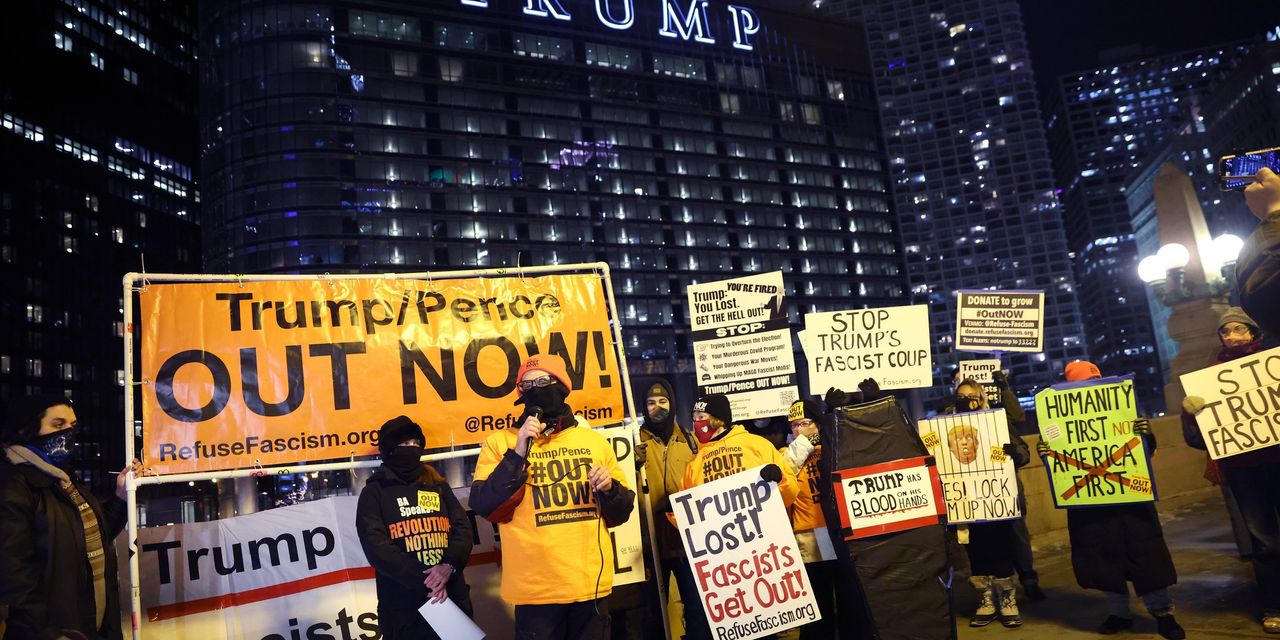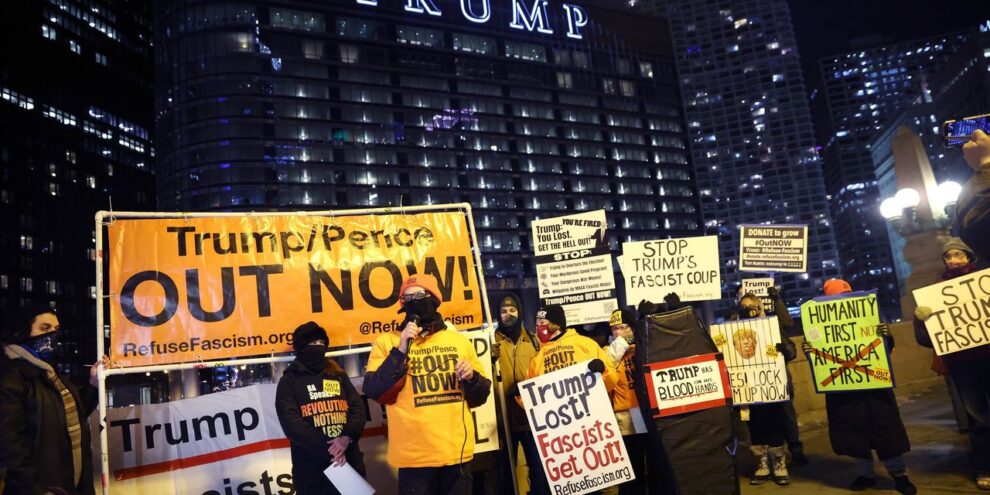
Donald Trump borrowed hundreds of millions of dollars against his properties before he took office, but the 45th president of the U.S. may find it tough to secure new loans come Jan. 21, experts interviewed by MarketWatch said.
“I don’t know where commercial bankers are going to be willing to lend large sums to the Trump Organization,” said Gerald Hanweck, a professor of finance at George Mason University and an expert on financial distress in the banking system.
Concerns about President Trump’s ability to obtain debt on his bread-and-butter real-estate business follow a dramatic final two months of his presidency that reached a low point on Wednesday when hundreds of rioters, pushing past security barriers and security, breached the Capitol as lawmakers were going through the typically ceremonial procedure of confirming President-elect Joe Biden’s win over Trump. The violent storming of the Capitol, which resulted in the death of four people and the ransacking of the seat of government, followed a rally where Trump urged his supporters to head to the Capitol and “fight.”
“ ‘I don’t know where commercial bankers are going to be willing to lend large sums to the Trump Organization.’ ”
Experts speculate that lenders and real estate partners could now join some American corporations in severing ties with Trump, after recent events that rank as one of the darker episodes in American history.
Democratic lawmakers on Friday, led by House Speaker Nancy Pelosi, said they are pushing to reconvene the House as early as next week to vote to send articles of impeachment to the Senate, which would mark the second attempt to impeach Trump in a tumultuous four years in the White House.
Hanweck, who formerly worked in the Federal Deposit Insurance Corporation’s risk-management division, said the Trump Organization might sidestep seeking loans from traditional lenders in favor of obtaining corporate-level financing from public markets to sustain its real-estate business.
He also suggested Trump could seek funding from abroad for any non-U.S. projects he seeks to develop, but that future financing of individual properties in the U.S. could be complicated by the continuing investigation by New York Attorney General Letitia James into the Trump Organization’s financial dealings. The attorney general’s office declined to comment.
“I think Trump’s best opportunity is to really go with a large investment banking company and look to issue a lot of marketable debt,” Hanweck suggested.
The Trump Organization didn’t respond to several requests for comment, nor did Trump’s White House staff.
Trump late Thursday denounced the Capitol attack, while also acknowledging that he lost the election two months ago, after weeks of pursuing legal challenges to his election loss to Biden, alleging unfounded claims of massive voter fraud.
But his apparent concession in the past 48 hours may do little to bolster his presidential legacy or his reputation as a business leader as he exits the political arena and re-enters life as a private citizen, at least over the shorter term.
“From an income standpoint, a lot of royalties on properties are based on the use of his name,” said William O’Connor, a partner focused on commercial real estate at law firm Thompson & Knight. “But for a guy who’s all about his brand, it could really injure his brand.”
A handful of commercial real estate professionals interviewed for this article said Trump’s initial resistance to denouncing the D.C. riot and slow acceptance of Biden’s win could add to the so-called “reputation risk” of lending to Trump.
“Anyone who goes through a partner risk-assessment has got to factor this into their calculus, especially any new partners,” said Matthew Cypher, director of Georgetown University’s Steers Center for global real estate, and formerly of Invesco’s real estate acquisitions group.
But Cypher also said the terms of existing loans ultimately will dictate the post-presidential relationship between Trump and his lenders. “Again, the legal documents are going to drive a lot of what happens. But in any business there are judgment calls,” Cypher told MarketWatch.
Trump brand
The private real-estate portfolio that Trump built over decades already was set to face tremendous challenges in the face of a historic public-health crisis.
Much of the commercial real estate landscape has been pummeled by the coronavirus pandemic after nearly a year, with COVID-19 claiming more than 4,000 U.S. lives in single day on Thursday.
Read: Distress looms over U.S. commercial real estate in 2021
While hotels and retail properties have been hardest hit, even the future of two prized office buildings in the Trump Organization portfolio remain in flux.
In November, Vornado Realty Trust, VNO, +0.70% a majority stakeholder in a venture with Trump on the iconic 555 California office building in San Francisco and 1290 Avenue of Americas in Manhattan, said on a quarterly earnings call that it continued to pursue a “sale, a partial sale, a joint venture, or a refinancing” of the two properties, despite prior offers falling short of initial expectations. Vornado didn’t respond to multiple requests for comment on the status of its partnership with Trump.
Trump took out hundreds of millions of dollars of loans on properties before entering the White House, many of which aren’t due for another three years, including some that were bundled up by Wall Street and sold to investors as bonds.
Longtime lender Deutsche Bank DB, -0.17% is owed about a combined $340 million on the Trump Doral golf course and resort in Miami, the Trump International Hotel Chicago and the Trump International Hotel in Washington, D.C., according to a tally completed by MarketWatch.
A spokesperson for Deutsche Bank declined to comment. Ladder Capital Corp. LADR, +0.61%, another prior lender to Trump, didn’t respond to several requests for comment.
A review of Trump’s mortgages shows that many of the loans required personal guarantees, likely a consequence of prior defaults and bankruptcies, including the high-profile failure of his Taj Mahal casino and hotel in Atlantic City, lawyers said.
That means it could be harder for Trump to walk away from the debt on any struggling properties without jeopardizing his personal wealth. Forbes puts Trump’s net worth at $2.5 billion, but his wealth has been a frequent topic of debate.
Even so, benefits of the presidency could follow Trump beyond public office, even if foreign governments become less willing to book at his Washington, D.C., hotel, or revenues decline at his golf and resort properties as Trump’s presidential security detail is reduced, said Norm Miller, Hahn chair of real estate finance at the University of San Diego.
“But historically, presidents have been sought-after as speakers and paid fees from $50,000 to $750,000 per talk, so he may be able to tap into stomping for bucks,” he told MarketWatch, adding “and he can pay himself from his political war chest of over $220 million, which has few strings.”






